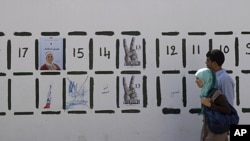In his speech to the United Nations General Assembly in late September, President Barack Obama renewed his promise to support the Arab Spring: "The United States will continue to support those nations that transition to democracy with greater trade and investment, so that freedom is followed by opportunity. We will pursue a deeper engagement with governments, but also with civil society — students and entrepreneurs, political parties and the press."
Less than a week later, U.S. Secretary of State Hillary Clinton and Tunisian Foreign Minister, Mohammed Mouldi Kefi, signed the U.S.-Tunisia Joint Political And Economic Partnership.
Hard on the heels of the signing of this agreement, the U.S. sent a delegation to Tunisia, led by Assistant U.S. Trade Representative for Europe and the Middle East Daniel Mullaney and Assistant U.S. Trade Representative for Services and Investment Christine Bliss, where they re-launched the 2002 bilateral trade and investment framework agreement.
Assistant Trade Representative Mullaney noted that the U.S. can help Tunisia's transition to democracy and an open economic system, by enhancing U.S. trade and investment integration with Tunisia, thus increasing economic growth and creating jobs.
Tunisia especially hopes to use its well educated, skilled and youthful population to become a regional economic hub. So, the Tunisian people and their government are eager to start building an open and competitive economy that will create jobs and prosperity not just in Tunisia, but in the entire North African region. Thus the two sides quickly sat down to begin planning ways to boost bilateral trade and investment.
"Today, Tunisians are looking for new investments, increased transparency, greater access to global and regional markets, and new assistance for their entrepreneurs. That is why we are launching the U.S.-Tunisia Joint Political and Economic Partnership, which is a foundation for our relationship that will not only support the short-term needs of the Tunisian people, but also their long-term economic aspirations. Tunisia is open for business, and we want people to know that," said Secretary of State Clinton.
"We proudly stand with Tunisia at this critical time in your history, and do all we can to assist you in realizing a future of peace, progress, and opportunity."
Supporting Tunisia's Transition To Democracy

"The United States will continue to support those nations that transition to democracy with greater trade and investment, so that freedom is followed by opportunity."



